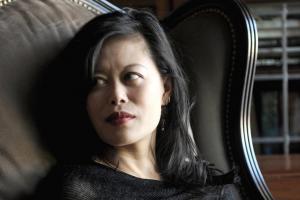
Karen Lam, Class of 1995, began her career as an entertainment lawyer, but in 2000 turned her attention to working full-time as a writer, producer and director in the film and television industry, with a particular talent for horror films. She has produced four feature films, eight short films and three television series, and has had her work recognized with numerous awards and honours. Her latest film Evangeline (www.evangelinefilm.com) is premiering in Fall 2014. She talks about the intersections between law, horror and the entertainment industry.
You graduated from UBC Law in 1995. What did you do before and after law school?
I did my articles with Guild, Yule, working in insurance litigation. After I got called to the Bar, I worked as a lawyer in the film and television industry. Now I’m a full time writer/director and producer. I can’t imagine working in any other industry now. It’s like a wonderful, creative and totally dysfunctional family that I adore with all my heart.
How did you get involved in making horror films?
I’ve always loved horror, but got into it from the literary side. I was a book nerd, and grew up with a lot of Grimms fairytales, Edgar Allen Poe, Mary Shelley, Daphne du Maurier, Stephen King… My dad loved violence and gore, so my first film was Jaws.
Did your legal training at UBC help your career in film making in any way, or are they unrelated?
Absolutely related. I got into the film industry as in-house legal counsel at Creative BC, and helped draft the tax credit legislation for the province. My career began from the legal and financing side of film, so I honed my abilities from the sales and financial structuring side – before getting back to my creative roots. As a writer, I think that writing legal briefs and my litigation practice is integral to concise story-telling. I think all lawyers are storytellers at heart: we reshape the story to strengthen our client’s position. It’s not that different from building a world to fit a fictional protagonist. As a director, the legal training really taught me focus. You can drive through the clutter of production and always keep your eye on the objective. Production can be chaotic, but so is building a strong legal case.
What are you working on at the moment?
Do you see any similarities between studying law and making films?
I think my legal training was integral to what I do now. It’s about having a disciplined mental approach to your profession, whether it’s in traditional law or in a different field. Law is creative, even if the outside world doesn’t recognize it, and film finance was always a creative endeavor to me. And I don’t mean that in a facetious way. You’re always trying to build something, whether it’s a case or a film, and legal training is a way of thinking. It’s easy to get caught up in supposition, and it’s important to have a structured but inquisitive approach to your work. If people tell you something can’t be done, I want to go beyond that: Why not? And often, I find that there’s always a solution. I don’t take things at face value. There are too many nuances to just accept the common answer.
Do you have any advice for other law graduates who might be interesting in pursuing unusual occupations?
For me, my profession is my passion, and it’s the thing that drives my life. It sounds like a bad Hallmark card, but you really do have to follow your passion. It’s the only thing that is going to give you satisfaction in your life, and a real purpose – even if you’re sitting in a wet ditch on your 12th hour of shooting in February. It’s easy for law students (face it, we’re all Type A obsessives) to get caught up in the race for external prestige. We don’t make decisions for money very often, but we do make decisions based on getting respect and recognition from our peers, often to our own detriment. Getting a gold star for grinding away at something you hate can turn into a kind of prison. The hard thing about the creative world of film and television is that you might not be getting those “gold star” moments. The satisfaction of the work is what drives you, not the end result.